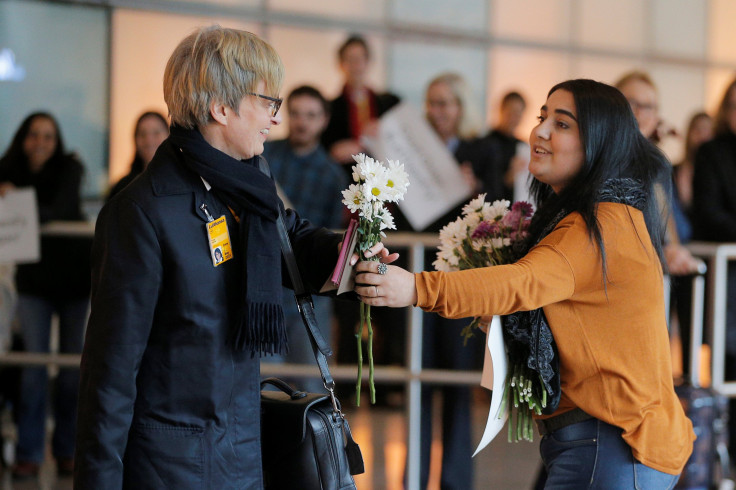Trump's Executive Orders Latest: Everything To Know About Immigration Ban, Judge Decision

The Trump administration Sunday regrouped after a federal appeals court refused to stay a Seattle judge’s order blocking President Donald Trump’s executive order barring people from seven Muslim-majority countries from entering the United States.
Vice President Mike Pence broke with the president, saying in an interview on ABC’s “This Week,” U.S. District Judge James Robart, a George W. Bush appointee, “certainly” had the authority to block the executive order that barred travelers from Iran, Iraq, Libya, Somalia, Sudan, Syria and Yemen from entering the United States for at least 90 days.
The 9th U.S. Circuit Court of Appeals early Sunday upheld Robart’s ruling, refusing to reinstate Trump’s order immediately and asked both sides to file arguments by Monday.
While the case is being adjudicated, what is happening?
The State Department, which had “provisionally revoked” 60,000 visas since the Jan. 27 order began reinstating them, which means travelers can resume their trips to the United States — at least until the ban is declared legal.
The action prompted many to rush to the airport, fearing the window of opportunity would again slam shut.
Where are the travelers going?
Many changed their destinations, opting for Boston where another federal judge last weekend also blocked Trump’s order.
“We had more than 40 mostly Iranian nationals land and clear customs today. We’ve had Tunisians and Syrians too, all flying from Germany on Lufthansa,” Kerry Doyle, an attorney with the American Immigration Lawyers Association, who was at Logan International Airport, told the Los Angeles Times.
Where does the rest of the administration stand?
Homeland Security Secretary John Kelly has ordered border patrol agents to comply with the court order as the State Department began reinstating visas.
"Those individuals with visas that were not physically cancelled may now travel if the visa is otherwise valid," the State Department said. Officials at State also contacted airlines to advise them of the change in the administration’s position.
"There is no stopping any passenger if they have a visa," Hossam Hussein, Egyptair's manager for flights to New York, told NBC.
What does President Trump think?
The president issued a tweetstorm against the ruling and warned it would allow “dangerous people” to pour into the United States — despite the lengthy vetting process refugees undergo. He also berated Robart as a “so-called judge,” something that didn’t sit well with congressional leaders.
Pence told “Fox News Sunday” the administration will use “all legal means at our disposal” to reinstate the ban.
“From the outset of his campaign and administration, the president of the United States has made it clear to put the safety of the American people first,” Pence said. “We are going to win this argument.”
Pence told NBC’s “Meet the Press,” Congress gave the president the authority to act on this issue.
“We're very confident the president's operating within his authority as president, both under the constitution, and under clear statutory law. That's what's so frustrating about the decision,” he said, adding there was nothing hasty about issuing the order even if “the usual niceties” weren’t extended to members of Congress.
What do Paul Ryan and Mitch McConnell think?
The House speaker told “Meet the Press” the order is not a “Muslim ban. It’s not a religious test,” but it should have been handled differently.
McConnell told CNN’s “State of the Union” it’s unlikely Congress will take any action of the courts strike down the ban.
"I mean, the courts are going to decide whether the executive order the president issued is valid or not, and we all follow court orders," McConnell said.
"We need to be careful about this," he said, adding, "There's a fine line here between proper vetting and interfering with the kind of travel or suggesting some kind of religious test, and we need to avoid doing that kind of thing."
What happens next?
Government lawyers defending the ban and plaintiffs will submit briefs Monday to the 9th Circuit. It will then be up to the judges to rule based on the briefs or schedule arguments before issuing an opinion. Either way, the case is likely to end up in the U.S. Supreme Court.
© Copyright IBTimes 2025. All rights reserved.






















